Opinion
Attacks on Cardinal outrageous and unacceptable
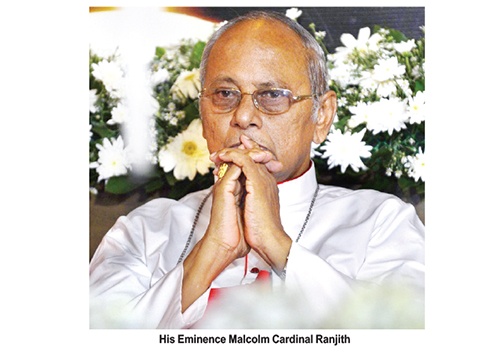
In strong defence of Cardinal
By ROHANA R. WASALA
As evident in social media, His Eminence Archbishop Malcolm Cardinal Ranjit is taking heavy flak from certain quarters for urging the authorities to bring to justice the culprits behind the suicide bomb attacks on three churches and four hotels on Easter Sunday last year (April 21, 2019), on the findings of the presidential commission, which is about to close its proceedings. It is not clear whether the critics are supporters or opponents of the government or the Opposition; but they are definitely not lovers of the country/nation. The criticism of the Cardinal is no doubt politically motivated, though he himself is absolutely above partisan politics. He is an ideal Shepherd not only for his Flock, but also for all Sri Lankans, in both spiritual and secular (mundane) senses; he is performing this role most sincerely, with the greatest courage, and ascetic selflessness, without expecting any personal reward. It is with some reluctance and hesitation that I am broaching this subject, because I don’t want to even remotely link his name to mundane politics. Globally, the Cardinal is a great asset for our crisis-ridden country.
In response to Opposition queries regarding the progress of the presidential probe into the Easter Sunday (April 21, 2019) suicide bombings, the newly appointed Minister of Public Security, Rear Admiral (Retd) Dr Sarath Weerasekera, told Parliament (December 5) that 257 persons (suspected of involvement) have been remanded and that 86 are being held under detention orders, and that he would meet the Attorney General on Monday (December 7) to talk about expediting legal proceedings on the basis of the commission’s findings. The government has indicated that the presidential commission is about to finalise its work. The minister’s statement came amidst exchanges between Opposition and government benchers, centering on certain misgivings previously expressed by His Eminence Malcolm Cardinal Ranjit about the imminent winding up of the presidential commission of inquiry and the follow-up process. Asked about the same subject by the media the next day (December 6), Minister Weerasekera said he could understand the prelate’s concerns, and that although the Cardinal didn’t know about it, almost 90% of what should be done through the government has already been done by the police: 37 have been charged with manslaughter and others with aiding and abetting terrorism.
The 2019 April 21 Easter Sunday suicide bomb attacks were a bolt from the blue. The bombers targeted three Catholic/Christian churches situated in Colombo, Negombo and Batticaloa and four hotels, three of them luxury class hotels in Colombo and another hotel at Dehiwala, near the zoo. An eighth bomber blew himself up in a residential part of Dematagoda. These near simultaneous coordinated attacks by Islamist terrorists left at least 277 dead, including the eight bombers, and more than 500 injured, according to different but generally compatible media accounts. The dead and injured men, women and children in the church attacks had been participating in Sunday mass. Among hotel attacks casualties, there were 38 foreigners. It has now been revealed that there had been a plan to attack the Kandy Esala Perahera as the next target, but that plan was not carried out. The attacks were absolutely unprovoked and pointless from the point of view of the normal civilized world.
Of course, the eight bombers and the individuals who sponsored them wouldn’t have looked at the bombings that negative way. The choice of targets, including the Kandy Esala Perahera that they were planning to attack but later spared, suggests that they were aiming to destabilise Sri Lanka both internally and externally. Isolating Catholic/Christian churches and tourist hotels for the attack was most probably meant to create as powerful an adverse impression as possible among nations across the world, about the country that justifies foreign intervention in its domestic affairs; had a few Buddhist temples been targeted instead, the international impact would not have been so much. Hollow expressions of solidarity trumpeted from an unexpected direction with what looked like a gush of indecent haste, even before the reverberations of the bombings had properly died down, did little to allay the public’s growing suspicions of a foreign conspiracy behind the attacks. (Incidentally, the Cardinal mentioned the apparent possibility of such a conspiracy, earlier than most speakers.) In fact, SLMC MP Rauff Hakeem revealed to the Presidential Commission of Inquiry on Easter Sunday attacks, in camera, what he knew about alleged foreign involvement in the heinous crime; former president and SLFP MP Sirisena, who appeared before the same commission, also said that a foreign power was involved, though he did not name it.
The bombers and their sponsors must have been quite clear about their respective aims. For the terror sponsors the whole operation must have been nothing but a political project for destabilizing Sri Lanka. For the eight suicide attackers, it was purely a pious religious mission with a direct heavenly reward, and the additional advantage of serving the cause they believed in by instilling fear into infidels (that is, all non-Muslims including atheists, agnostics and others like people of no religion), as an internet post by an ex-Muslim argued (an argument that the majority of ordinary Sri Lankans are sure to dismiss as false).
Testifying before the presidential commission of inquiry former Eastern Province Governor M. L. A. M. Hizbullah said, according to the media (November 27), that he hoped to open the Batticaloa University after talks with the government, when the corona spread crisis is over. He claimed that he built it to teach the poor children of the Eastern province and that, when completed, it will be the biggest university in Asia; it had been planned to be built on 100 acres of land. He had received, it was reported, some 3.6 billion rupees in funds from donors in Saudi Arabia. No doubt, after what transpired at the presidential inquiry that cast doubt on the sincerity of Hizbullah et al, his nonchalance shocked and dismayed most of us; because it gave rise to fears among the concerned public that the unlawfully established Sharia college project will go ahead, without related issues being settled beforehand.
Islamic instruction conducted by fundamentalists even in the Islamic ‘madrasas’ in the 95% Muslim Pakistan, has been found to be problematic. About a year and a half ago, the Pakistan government under PM Imran Khan, moved to take over some 30,000 madrasas across the country with a view to ‘mainstreaming’ them, in response to international pressure, following many complaints that they radicalised the youngsters. Islamic terror attacks carried out in India and Afghanistan, were blamed on young Pakistanis who had learned in these madrasas. If that is the situation in the religiously near homogeneous Pakistan (pop. 212 m), is it unnatural for the much smaller, multi-religious Sri Lanka (pop. hardly 22 m) to be concerned about a Sharia University on its territory, that too potentially the biggest one in Asia?
Hakeem falsely complained to an Indian newspaper that Muslims faced communally institigated retaliatory violence after the Easter attacks. He was basing himself on reports of a few incidents in some unrelated places far from where the bombings took place. Muslims and other religionists and their shops and houses were indiscriminately targeted in these instances, allegedly caused by paid agent provocateurs employed by supporters of the yahapalana regime of the time; these are described in the Wikipedia (obviously, as fed in by an anti-Buddhist editor) as “anti-Muslim riots in retaliation to the bombings that were organized by the Sri Lankan Buddhist Extremist Group on Vesak Day…” (Actually, the monks of the BBS, which is meant here, played a big role in the rescue operations after the blasts, including blood donations; some blood donors had to be turned away because enough blood had been collected. Buddhists, let alone Buddhist monks, never indulge in violence, except under extreme provocation; they are least likely to do that on the day of Vesak, the holiest day in the Buddhist calendar.)
It is inconceivable how the Sharia and the madrasas problem could be effectively addressed without the cooperation of mainstream Muslims, who form 9.7% of the population. But such cooperation cannot be expected from the likes of Hizbullah and Hakeem. Not long before the Easter Sunday attacks, Hizbullah was reported as warning that Muslim youth in the Eastern Province might take up arms unless their grievances were answered (by the then government). What these grievances were only he knew. But before the time he was thus falsely complaining, there were internecine clashes among Muslims in the area, between jihadists and traditionalists, which resulted in murderous violence and property destruction. The travails of the persecuted traditional Muslims did not seem to move Hizbullah to identify with them or speak up on their behalf. Some of these persecuted Muslims made secret contact with the monks of the BBS in Colombo to plead with them to intervene, and even provided them with documentary evidence of what they were undergoing in the east at the hands of extremists.
In the aftermath of the Easter attacks, the victim Catholics were wisely and ably restrained by the Cardinal from thoughts of committing any retaliatory violence against ordinary Muslims. He rose to the occasion, as a beacon of hope, a symbol of compassion, forgiveness, and forbearance, and a great provider of emotional comfort for all Sri Lankans at that moment of universal sorrow and shock. This resonated with the characteristic patience and resilience of the general Sri Lankan populace.
Returning to criticisms of the Cardinal over remarks he made about the progress of the Easter Sunday attacks probe, this is not the first time that the prelate has articulated such sentiments regarding the performance of politicians, whether they happen to be in the government or in the Opposition, without himself playing politics. He always expresses his opinions candidly, without any malice or bias towards anyone. He says that though the church has forgiven the attackers, their sponsors must still be brought to justice, as the BBC once reported. At an audience he gave to SJB MP Kavinda Jayawardane of the Opposition, who called on him on December 3, Cardinal Ranjit expressed his sincere hope and adamant demand that the findings of the presidential inquiry be not swept under the carpet under any circumstances or be subjected to any kind of political horse trading; he also wanted the real movers and shakers behind the Easter bombing savagery be firmly dealt with according to the law. To emphasize his point, he added that if the present government fails to mete out justice to the victims by punishing those responsible, then the job will have to be given to another group of people who can do it. The Cardinal implied, however, that he has not lost his trust in the assurances already given by the president that justice will be done under his watch.
People who believed that the Cardinal is universally admired for all that he is doing for the country and for the ideals that he is bravely standing up for, were in for a rude shock. Hizbullah’s oddly defiant, affected cool that smacked of calculated dissembling (at the presidential commission) went almost unnoticed and hardly commented on, whereas the sincere, well-meant remarks made by the Cardinal about the progress of the presidential inquiry caused a flurry of adverse reactions in the media. He has been described as guilty of ‘hate speech’ for saying what he said! He’s also been made guilty of treason, for he, as one critic pointed out, has threatened to ‘overthrow the government’ by talking about handing over the business of punishing the persons involved in organizing the terror attacks to another party, even though he leads only 7.4% of the population.
I find such attacks on the Cardinal simply outrageous, indecent, and unacceptable. We know Sri Lanka has a history of appointing commissions of inquiry as a strategy to consign vital problems to oblivion. It is not wrong to invoke that reality at the present time, when we have enough reason to believe that there’s going to be a change in that unhallowed tradition, particularly, under our new president. The Cardinal has been for years stressing the need to preserve the Buddhist cultural identity and heritage of Sri Lanka, and striving to unite people following different religions as children of Mother Lanka into a peaceful, harmonious and virtuous society. He is often seen participating in Buddhist events. It is not difficult to understand that his unconventional behaviour does not go down well with some conservative Catholics. Perhaps, his severest critics are Catholics who are upset at what they probably dislike as his too accommodating attitude towards Buddhism and Buddhist monks. Buddhists have no reason to attack him when he is seen to be giving just a timely fillip to boost the confidence of the authorities who are set to move in the right direction, under arguably the least realpolitik-driven executive we have got since independence.
I would like to wind up with this tentative proposal, respectfully offered, for the attention of the President: What about inviting representatives of the clergy of the three minority religions – they should be of the same stature as the Nayake monks within their respective hierarchies – to be participating guest members of the Buddhist Advisory Council that the president consults every month? The possible advantages of such a move are self-evident.
- News Advertiesment
See Kapruka’s top selling online shopping categories such as Toys, Grocery, Flowers, Birthday Cakes, Fruits, Chocolates, Clothing and Electronics. Also see Kapruka’s unique online services such as Money Remittence,News, Courier/Delivery, Food Delivery and over 700 top brands. Also get products from Amazon & Ebay via Kapruka Gloabal Shop into Sri Lanka.
Opinion
Take Human Rights seriously, not so much the council or office
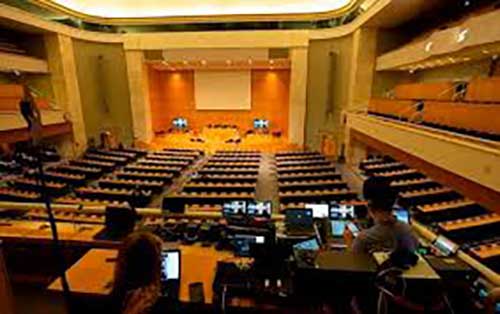
By Dr Laksiri Fernando
The 46th Session of the UN Human Rights Council started on 22 February morning with obvious hiccups. The Office, to mean the Office of the UN High Commissioner for Human Rights, finally decided to hold all sessions virtually online, only the President of the Council and the assistants in the high table sitting at the UN Assembly Hall in Geneva. The President, Ms. Nazhat Shammen Khan, Ambassador from Fiji in Geneva, wearing a saree, was graceful in the chair with empty seats surrounding.
In the opening session, the UN General Assembly President, UN General Secretary, UN High Commissioner for Human Rights, and Head of Foreign Affairs, Switzerland (as the host country), addressed remotely the session. In fact, there was no need for Switzerland to have a special place, as the UN is independent from any host country. Switzerland is fairly ok, however, if this tradition is followed, the UN General Assembly may have to give a special place to the US in New York.
Initial Addresses
UN General Secretary, Antonio Guterres’ address could have been quite exemplary if he gave a proper balance to the developed and developing countries. He talked about racism and fight against racism but did not mention where racism is overwhelmingly rampant (US and Europe) and what to do about it. Outlining the human rights implications of Covid-19 pandemic, he made quite a good analysis. It was nice for him to say, ‘human rights are our blood line (equality), our lifeline (for peace) and our frontline (to fight against violations).’ However, in the fight against violations, he apparently forgot about the ‘blood line’ or the ‘lifeline’ quite necessary not to aggravate situations through partiality and bias. He never talked about the importance of human rights education or promoting human rights awareness in all countries.
His final assault was on Myanmar. Although he did not call ‘genocide,’ he denounced the treatment of Rohingyas as ethnic cleansing without mentioning any terrorist group/s within. His call for the release of Aung San Suu Kyi and other civilian leaders undoubtedly should be a common call of all. However, he did not leave any opening for a dialogue with the military leaders or bring back a dialogue between Aung San and Min Aung, the military leader. With a proper mediation, it is not impossible. Calling for a complete overhaul as the young demonstrators idealistically claim might not be realistic.
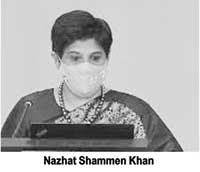 High Commissioner Michelle Bachelet’s address was brief and uncontroversial this time without mentioning any country or region. It is clear by now perhaps she is not the real author of the Report against Sri Lanka, but someone probably hired by the so-called core-group led by Britain. Her major points were related to the coronavirus pandemic trying to highlight some of the socio-economic disparities and imbalances of policy making that have emerged as a result. The neglect of women, minorities, and the marginalized sections of society were emphasized. But the poor was not mentioned. As a former medical doctor, she also opted to highlight some of the medical issues underpinning the crisis.
High Commissioner Michelle Bachelet’s address was brief and uncontroversial this time without mentioning any country or region. It is clear by now perhaps she is not the real author of the Report against Sri Lanka, but someone probably hired by the so-called core-group led by Britain. Her major points were related to the coronavirus pandemic trying to highlight some of the socio-economic disparities and imbalances of policy making that have emerged as a result. The neglect of women, minorities, and the marginalized sections of society were emphasized. But the poor was not mentioned. As a former medical doctor, she also opted to highlight some of the medical issues underpinning the crisis.
Then came the statements from different countries in the first meeting in the following order: Uzbekistan, Colombia, Lithuania, Afghanistan, Poland, Venezuela, Finland, Fiji, Moldova, Georgia, Kazakhstan, Equatorial Guinea, Vietnam, Belgium, and Morocco. The obvious purposes of these statements were different. Some countries were apparently canvassing for getting into the Human Rights Council at the next turn perhaps for the purpose of prestige. Some others were playing regional politics against their perceived enemies. This was very clear when Lithuania and Poland started attacking Russia.
But there were very sincere human rights presentations as well. One was the statement by the President of Afghanistan, Mohammad Ashraf Ghani. He outlined the devastating effects that Afghanistan had to undergo during the last 40 years, because of foreign interferences. The initial support to Taliban by big powers was hinted. His kind appeal was to the UN was to go ‘beyond discourse to practice’ giving equal chance to the poor and the developing countries to involve without discrimination.
Controversial Presentations
China’s Foreign Affairs Minister, Wang Yi, made his presentation almost at the end of the first day. This is apparently the first time that China had directly addressed the Human Rights Council. Beginning with outlining the devastating repercussions of the coronavirus pandemic he stressed that the world should face the challenges through ‘solidarity and cooperation.’ He broadened the concept to human rights solidarity and cooperation. His expressed views were quite different to the others, particularly to the Western ones.
He frankly said that what he expresses are the views of China on human rights without claiming those are absolute truths or forcing others to believe or implement them. There were four main concepts that he put forward before the member countries. First, he said, “We should embrace a human rights philosophy that centres on the people. The people’s interests are where the human rights cause starts and ends.” Second, he said, “we should uphold both universality and particularity of human rights. Peace, development, equity, justice, democracy, and freedom are common values shared by all humanity and recognized by all countries.” “On the other hand,” he said, “countries must promote and protect human rights in light of their national realities and the needs of their people.”
“Third,” he said, “we should systemically advance all aspects of human rights. Human rights are an all-encompassing concept. They include civil and political rights as well as economic, social, and cultural rights.” He then emphasized, “Among them, the rights to subsistence and development are the basic human rights of paramount importance.” Fourth, “we should continue to promote international dialogue and cooperation on human rights. Global human rights governance should be advanced through consultation among all countries.”
It was on the same first day before China, that the United Kingdom launched its barrage against several countries not sparing Sri Lanka. The Foreign Secretary, Dominic Raab, delivered the statement from top to bottom attacking alleged violating countries on human rights. But there was no mentioning of Israel for the repression of Palestinians or the systemic racism rampaging in the United States, including the 6 January attacks on the Capitol by extremist/terrorist groups.
His first sermon was on Myanmar without acknowledging the British atrocities or mismanagement of this poor and diverse country during the colonial period. He was quite jubilant over implementing sanctions and other restrictions over the country. Many sanctions, in my opinion, are extortions. Undoubtedly, Aung San Suu Kyi and other leaders should be released, and democracy restored. This is a task of the whole council and when one or two countries try to grab the credit, there can be obvious reservations of others.
His further scathing attacks were against Belarus, Russia, and China. Some appeared factually correct but not necessarily the approach or the motives genuine. The following is the way he came around Sri Lanka. He said,
“Finally, we will continue to lead action in this Council: on Syria, as we do at each session; on South Sudan; and on Sri Lanka, where we will present a new resolution to maintain the focus on reconciliation and on accountability.”
‘Action’ to him basically means repeatedly passing resolutions, of course imposing economic and other sanctions. He said, “as we do at each session”; like bullying poor or weak countries at each session. Can there be a resolution against Russia or China? I doubt it.
What would be the purpose of presenting a resolution against Sri Lanka? As he said, “to maintain the focus on reconciliation and on accountability.” This will satisfy neither the Tamil militants nor the Sinhalese masses. But it might satisfy the crafty Opposition (proxy of the defeated last government). This is not going to be based on any of the actual measures that Sri Lanka has taken or not taken on reconciliation or accountability. But based on the ‘Authoritarian and Hypocritical Report’ that some anti-Sri Lankans have drafted within the Office of the High Commissioner for Human Rights. This what I have discussed in my last article.
In this context, successful or not, the statement made by the Sri Lanka’s Minister of External Affairs, Dinesh Gunawardena, in rejecting any resolution based on the foxy Report of the Office of the UN High Commissioner for Human Rights, in my concerned opinion, is absolutely correct.
Opinion
President’s energy directives ignored by the Power Ministry: Another Point of View

Dr Tilak Siyambalapitiya
Dr Janaka Rathnasiri laments (The Island 19 Feb 2021) that the Power Ministry has ignored the President’s directive to draw 70% of energy from renewable sources by 2030. I saw the approved costs of electricity production for 2019, published by the Public Utilities Commission (PUCSL).
PUCSL has also approved the prices to sell electricity to customers. Although various customers pay at various “approved” prices, the average income from such “approved” prices in 2019 was Rs 17.02 per unit. It is not only the Ministry, according to Dr Rathnasiri, ignoring the President; PUCSL is also breaking the law, which says prices and approved costs should be equal.
 So there is already an illegal gap of Rs 21.59 minus 17.02 = Rs 4.57 per unit of electricity sold. If electricity prices are not to be increased, as stated by many in the government and PUCSL, let us say the following: Distribution costs should decrease by 0.57 Rs per unit. Generation costs should decrease by Rs 4.00 per unit.
So there is already an illegal gap of Rs 21.59 minus 17.02 = Rs 4.57 per unit of electricity sold. If electricity prices are not to be increased, as stated by many in the government and PUCSL, let us say the following: Distribution costs should decrease by 0.57 Rs per unit. Generation costs should decrease by Rs 4.00 per unit.
PUCSL also published the approved cost of purchasing or producing electricity from various sources for 2019. The actual energy values were different to what was approved, but let us stick to PUCSL approved figures:
I suggest Dr Rathnasiri fills-up the following table, to show how much electricity will cost in 2030 to produce and deliver, if the President’s 70% target is to be achieved and for PUCSL to abide by the law. Let us assume that electricity requirement in 2030 will be double that of 2019.
 Since PUCSL has to save Rs 4 from 13.92, the average selling price for energy should be Rs 13.92 minus 4.00 = Rs 9.92. With a target network loss of 7% (in 2019 it was 8.4%), the average cost of production has to be Rs 9.27 per unit. Eight cages have to be filled-up by Dr Rathnasiri.
Since PUCSL has to save Rs 4 from 13.92, the average selling price for energy should be Rs 13.92 minus 4.00 = Rs 9.92. With a target network loss of 7% (in 2019 it was 8.4%), the average cost of production has to be Rs 9.27 per unit. Eight cages have to be filled-up by Dr Rathnasiri.
In 2012, PUCSL approved the energy cost of electricity produced from coal power to be 6.33 Rs per kWh. In 2019, PUCSL approved 9.89 (56% increase). For renewable energy, it was 13.69 in 2012, and 19.24 in 2019 (a 40% increase, but double the price of electricity from coal fired generation). In 2012, rooftop solar was not paid for: only give and take, but now paid Rs 22, against Rs 9.89 from coal. There seems to be something wrong. The price reductions of renewable energy being promised, being insulated from rupee depreciation, are not happening? Either Sri Lanka must be paying too little for coal, or it may be renewable energy is severely over-priced?
On coal we hear only of some corruption every now and then; so Sri Lanka cannot be paying less than it costs, for coal.
Enough money even to donate
vaccines
 Another reason for the Ministry of Power to ignore the President’s directive may be the Ministry’s previous experience with similar Presidential directives. In 2015, the President at that time cancelled the Sampur coal-fired power plant, and the Ministry faithfully obliged. That President and that Prime Minister then played ball games with more power plants until they were thrown out of power, leaving a two-billion-dollar deficit (still increasing) in the power sector. Not a single power plant of any description was built.
Another reason for the Ministry of Power to ignore the President’s directive may be the Ministry’s previous experience with similar Presidential directives. In 2015, the President at that time cancelled the Sampur coal-fired power plant, and the Ministry faithfully obliged. That President and that Prime Minister then played ball games with more power plants until they were thrown out of power, leaving a two-billion-dollar deficit (still increasing) in the power sector. Not a single power plant of any description was built.
Where is this deficit? You do not have to look far. In the second table, replace 24.43 with 9.89, to reflect what would have happened if Sampur was allowed to be built. The value 12.79 will go down to 8.55, well below the target of Rs 9.27 per unit to produce. Not only would CEB and LECO report profits, but the government too could have asked for an overdraft from CEB to tide over any cash shortfalls in the treasury. All this with no increase in customer prices. Producers of electricity from renewable energy could enjoy the price of 19.24 Rs per unit. And that blooming thing on your rooftop can continue to enjoy Rs 22 per unit. The Minister of Power, whom Dr Rathnasiri wants to replace with an army officer, would have been the happiest.
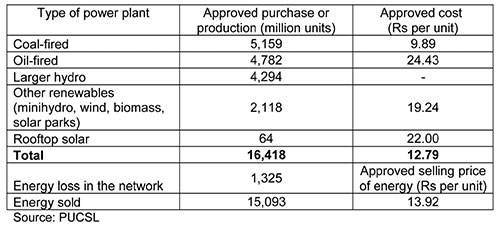 In the absence of Sampur (PUCSL’s letter signed by Chairman Saliya Mathew confirmed cancellation and asked CEB not to build it), PUCSL approved electricity to be produced at Rs 21.59 and sold at Rs 17.02 per unit. The annual loss would be Rs (21.59 – 17.02) x 15,093 = Rs 69 billion per year of approved financial loss. Sri Lanka has a Telecom regulator, an Insurance regulator, a Banking regulator, who never approve prices below costs. Sometime ago the telecom regulator asked the operators to raise the prices, when operators were proposing to reduce prices amidst a price war. But the electricity industry regulator is different: he approves costs amounting to 27% more than the price, not just once but, but continuously for ten long years !
In the absence of Sampur (PUCSL’s letter signed by Chairman Saliya Mathew confirmed cancellation and asked CEB not to build it), PUCSL approved electricity to be produced at Rs 21.59 and sold at Rs 17.02 per unit. The annual loss would be Rs (21.59 – 17.02) x 15,093 = Rs 69 billion per year of approved financial loss. Sri Lanka has a Telecom regulator, an Insurance regulator, a Banking regulator, who never approve prices below costs. Sometime ago the telecom regulator asked the operators to raise the prices, when operators were proposing to reduce prices amidst a price war. But the electricity industry regulator is different: he approves costs amounting to 27% more than the price, not just once but, but continuously for ten long years !
That is 370 million dollars per year as of 2019, the economy is spending, and for years to come, to burn oil (and say we have saved the environment). Did the Minister of Health say we are short of 160 million dollars to buy 40 million doses of the vaccine? Well, being a former Minister of Power, she now knows which Presidential “order” of 2015 is bleeding the economy of 370 million dollars per year, adequate to buy all vaccines and donate an equal amount to a needy country.
Prices are the production costs approved by PUCSL for 2019. The selling price approved by the same PUCSL was Rs 9.27 per unit.
Opinion
Confusion on NGOs and NSOs in Sri Lanka
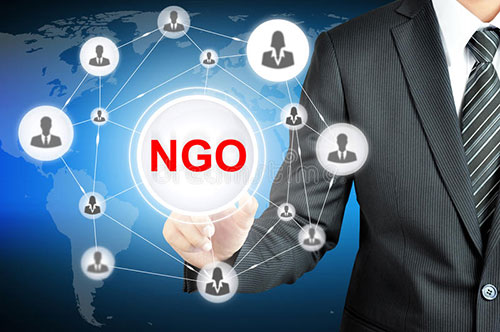
If you listen to politicians and journalists here, you will hear of that curious creature rajya novana sanvidane, a Non-State Organization (NSO). Where do you get them? In the uninstructed and dead minds of those who use those terms. In the real world, where politicians and journalists have developed minds, there are Non-Governmental Organizations (NGO). The United Nations is an organization set up by state parties, not by governments. It is true that agents of states, governments, make the United Nations work or fail. Governments may change but not the states, except rarely. When Eritrea broke away from Ethiopia, a new state was formed and was so recognised by the United Nations. However, the LTTE that tried to set up another state was crushed by the established state that it tried to break away from, and the UN had nothing to do with them.
This entirely unnecessary confusion, created out of ignorance, is so destructive that organizations completely loyal to the existing state, are made to be traitorous outfits, for they are ‘non-state organizations’ within the state. There are citizens of each state, but no citizens of any government. Government is but an instrument of the state. In most states there are organizations, neither of the state nor of government: religious organizations including churches. But none of them is beyond the pale of the state.
Those that speak of rajya novana sanvidane give that name partly because they have no idea of the origin of non-governmental organizations. NGOs came into the limelight, as donor agencies, noticed that some governments, in East Africa, in particular, did not have the capacity and the integrity to use the resources that they provided. They construed, about 1970, that NGOs would be a solution to the problem. Little did they realize that some NGOs themselves would become dens of thieves and brigands. I have not seen any evaluation of the performance of NGOs in any country. There was an incomplete essay written by Dr. Susantha Gunatilleka. NGOs are alternatives to the government, not to the state.
Our Constitution emphatically draws a distinction between the government and state, and lays down that the President is both Head of Government and Head of State (Read Article 2 and Article 30 of the Constitution.) It is as head of state that, he/she is the Commander of the Armed Forces, appoints and receives ambassadors and addresses Parliament annually, when a prorogued Parliament, reconvenes. He/she presides over the Cabinet as head of government. The distinction is most clear, in practice, in Britain where Queen Elizabeth is the head of state and Boris Johnson is the Prime Minister and head of government. However, in principle, Johnson is the Queen’s First Minister appointed by the sovereign, and resigns by advising her of his decision to do so.
In the US and in India the term ‘state’ has special significance. In India there is a ‘rajya sabha’ (the Council of States) whose members represent constituent States and Union Territories. Pretty much the same is true of the United States. In the US, executive power is vested in the President and heads the administration, government in our parlance. The Head of State does not come into the Constitution but those functions that one associates with a head of state are in the US performed by the President of the Republic. The US President does not speak of my state (mage rajaya) but of my administration, (mage anduva). Annually, he addresses Congress on the State of the Union. Our present President must be entirely familiar with all this, having lived there as a citizen of the US for over a decade. It is baffling when someone speaks of a past state as a traitor to that same state. It is probable that a government was a traitor to the state. ‘Treason against the United States, shall consist only in levying war against them, or in adhering to their (States’) enemies, giving them aid and comfort’. That a state was a traitor to the same state is gobbledygook.
Apart from probable confusion that we spoke of in the previous paragraph, it is probable that a president and other members of a government, including members of the governing party here, find it grandiloquent to speak of his/her/their state (mage/ape rajaya), rather than my government (mage anduva) or Sirisena anduva’ and not Sirisena state; it was common to talk of ‘ape anduva’ in 1956; politicians in 1956 were far more literate then than they are now.
When translating from another language, make sure that you understand a bit of the history of the concept that you translate. A public school in the US is not the same as a public school in the UK.
MAHADENAMUTTA









